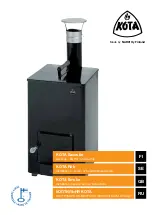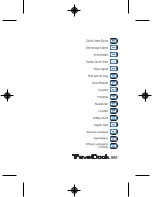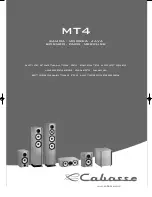
Wall Mounting
• Install the four rubber stick-on bumpers (one on each corner of the rear panel of the speaker) to
provide clearance for the speaker wire between the wall and cabinet. This will also prevent the
speaker from marring the wall.
• Cut out the template on the back cover of the owner’s manual to assist in obtaining proper
spacing of the two mounting holes. If the template is not available, space the mounting screws
4
9
/
16
" apart on a vertical line. Allow at least 1
1
/
2
" of clearance space above the top screw.
• Check the vertical orientation of the marked hole locations with a torpedo level before drilling.
• Use a #10 or #12 (2
1
/
2
- 3"long) pan head wood screw to mount into the wall stud.
• Check the fit of the screw head in the keyhole fitting before installation as screw head sizes do vary.
• Drill the proper size pilot holes at the marked positions and install the screws into the wall stud.
Leave the back surface of the screw head protruding about
1
/
4
-inch from the wall surface. This
will facilitate hooking the keyhole bracket over the screw head with the rubber feet installed. The
clearance between the wall and the screw head may need to be adjusted to achieve a proper fit.
If a stud is not available, use the proper type and weight rating of drywall or masonry anchor
appropriate for the wall construction. Please consult your dealer, custom installer or a building
contractor in this situation.
• Do not use the keyhole mounting brackets for ceiling installations!
How to Connect the Synergy Series Speakers
AC POWER / SP-1 ONLY
Since your SP-1 has an internal subwoofer power amplifier, it must be plugged into a nearby AC wall
outlet. The SP-1 should be unplugged from the AC power with the power switch in the OFF position
during hook up and installation. To eliminate a tripping hazard, all connections should be unplugged
from the back panel of the speaker if it is being moved. Avoid extremely long extension cords of small
gauge since they can impair the performance of the subwoofer amplifier and present a potential fire
hazard. If the SP-1 will not be used for an extended period of time, unplug the power cord from the
AC power outlet.
Note: 230 volt models are not supplied with an AC power cord, but are equipped with an IEC-type
power cord socket.
CAUTION!
Since your Klipsch SP-1 has built-in electronics, do not place it near sources of heat or moisture.
Take care to route the power cord so that it will not be cut, damaged or pinched.
SPEAKER WIRE CONNECTIONS
Switch your electronics OFF when making all connections! When making any type of speaker wire
connection be sure to observe proper polarity (+ to + and - to -). Most speaker wire is insulated,
two-conductor, stranded construction and is color-coded or has some distinguishing feature differen-
tiating the two conductors. Speaker wire connectors on most loudspeakers and amplifiers are also
color-coded. Typically, RED is positive (+) and BLACK is negative (-), or ground. It does not matter
which conductor is connected to the positive or negative terminals of your equipment as long as you
are consistent. Be sure that the connections from all of the amplifier channels to all of the speakers in
your system are connected in a like manner. If not, the quantity of bass will be reduced and the
stereo image will be compromised. Be careful not to have excess bare wire or loose strands of wire
at the connections. This could cause a short between adjacent positive and negative terminals, dam-
aging your speakers and amplifier. Eighteen gauge (AWG) wire is the minimum size recommended
for short distances, with larger gauges recommended for longer runs. Consult your Klipsch dealer for
specific suggestions.
Connect the SB-2, SB-3, SF-1, SF-2 or SP-1 to the “Front” or “Main” channel speaker outputs of
your system’s power amplifier.
!
!






























